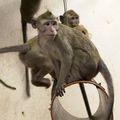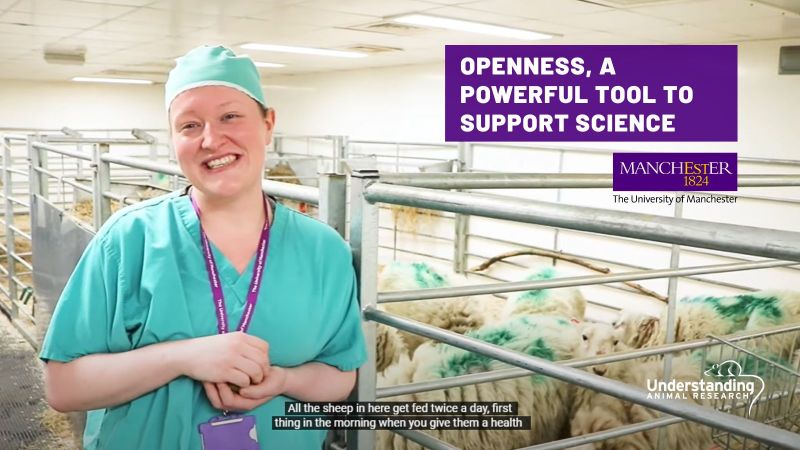 A report published today, called Review of research using non-human primates, recommends that scientific research on monkeys should continue in the UK, subject to rigorous safeguards. It considered that much of the research was outstanding in the quality of its science, in care of the animals used and in its likely benefits to medicine.
A report published today, called Review of research using non-human primates, recommends that scientific research on monkeys should continue in the UK, subject to rigorous safeguards. It considered that much of the research was outstanding in the quality of its science, in care of the animals used and in its likely benefits to medicine.
The similarity between monkeys and humans means that they are really important to the understanding of our bodies and diseases. Past benefits from monkey research include deep brain stimulation – a remarkable treatment for Parkinson's disease – and antiretrovirals for HIV, which mean that many sufferers can lead near normal lives. Major areas of current monkey research aim to improve our understanding of brain function and diseases that affect the brain, study human fertility and infertility, and to develop vaccines for serious illnesses such as malaria.
The monkeys used in this vital research are all small monkeys such as marmosets and macaques. Work involving animals is a small but important part of biomedical research, and of this work a tiny fraction involves the use of non-human primates. Of the 3.6 million animals used in UK research during 2010, only 0.07% (2,649) were primates.
The report reviews research on non-human primates over a 10-year period from 1996, funded by Wellcome Trust, Medical Research Council and the Biotechnology and Biological Sciences Research Council. It was produced by a panel of distinguished scientists and animal welfare experts, chaired by Professor Sir Patrick Bateson FRS.
The report says that techniques such as imaging the brains of living humans could replace work on monkeys. While imaging techniques can complement invasive research in monkeys they canot completely replace them. For example, non-invasive 'diffusion tensor imaging', which is based on MRI, can be used to chart wiring of the brain, but cannot tell you what information is being transferred or in what direction information is flowing.
Many of the report's recommendations have already been addressed, given that the review covers research conducted 5-15 years ago. Improvements include higher standards of animal care, replacement of monkeys in research, for instance by GM mice, and more rapid transfer of research findings to medical applications with consequent benefits for both humans and other animals.
The panel examined the publications of scientists who had been funded and the questionnaires they had been asked to complete. They made independent assessments of the scientific quality of the research, the welfare costs to the animal used and the likely benefits to medicine and the public good. However, assessment of potential medical benefits was often speculative because considerable time usually elapses between the publication of original research and translation of the findings into successful therapies.
The panel agreed that in many cases the use of non-human primates was justifiable. They were particularly struck by the benefits of funding research in interdisciplinary groups with clinical links where knowledge is readily transferred and medical benefits are most easily exploited. They applauded development and publication of refinements which reduced the welfare costs to the monkeys.
Roger Lemon, Chair of the Policy Advisory Group of Understanding Animal Research and Professor of Neuroscience at UCL Institute of Neurology, welcomed the report. He said it showed that although the funding agencies spend only a tiny fraction of their research budget on primate research, this investment has resulted in good quality neuroscience that had scientific impact. He continued:
'Much of the neuroscience research surveyed in the report is of a fundamental nature; but experience shows that these advances in the laboratory will ultimately lead to improvements in our treatment of some of the most challenging clinical problems facing our society: neurodegenerative disease and psychiatric disorders.'
'I fully endorse the report’s view that we need to further optimise the benefit from each and every primate used, because these monkeys are an incredibly sensitive and valuable animal model. NHP researchers in the UK are themselves constantly trying to refine their techniques and improve the welfare of monkeys in their care, and these efforts have received a considerable boost from the establishment of the UK National Centre for the 3Rs.'
'Primate research in the UK is under threat because of its high financial cost, which in turn is partly due to the special security measures needed to protect this important work. I am particularly glad that the report highlights the need to address this cost issue 'as a matter of urgency' and also its stress on the need to encourage training in this area of research. Both recommendations will help the UK to remain competitive in this critical area of medical research.'
Understanding Animal Research has produced a background briefing on UK primate research.
Last edited: 6 April 2022 13:17



